It is immensely cheering to find that "Solomon Eagle" does
not like dialect. Why do most of us feel as if we were committing a kind of intellectual snobbery when we shy at such lines 416 "Solomon Eagle" quotes in his Books in General, Second Series (Martin Seeker, 7s. 6d. net) :—
" For I haste her waur_nor iver, But shoo pulls, shoo pulls, all t'saame "
We thoroughly agree with Mr. J. C. Squire that we must not "start encouraging the gifted youths in Staffordshire, Cheshire,
and Rutland to turn their backs on the spelling they have learnt, and begin writing their epics and romances in something that looks to us like Polish." That is the crux of the matter. It is the spelling that counts. Strangeness of diction is stimulating if the eye is not offended. For example, on another page of
Mr. Squire's book we find a glorious rendering of the "Lorelei," of which the following are the second and third vanes It's time for the glims, and it's chilly, There ain't no wild waves on the Rhine ; And, ho, take a slant at that bill. lie 'S lit up like a booze-parlour sign.
A swell-lookin' Jane there is sittin' And flashin' a bushel of rooks ;
Dolled up in her glad rags, loose &tin', She chases the comb thro' her locks."
That is the difference. When we say we do not like dialect, we do not want to involve "When 'Omer smote 'is bloomin' lyre
one condemnation with "The Northern Farmer." Books in General is a most delightful and learned volume which we thoroughly recommend to any reader with pretensions to a love of vertu.










































 Previous page
Previous page